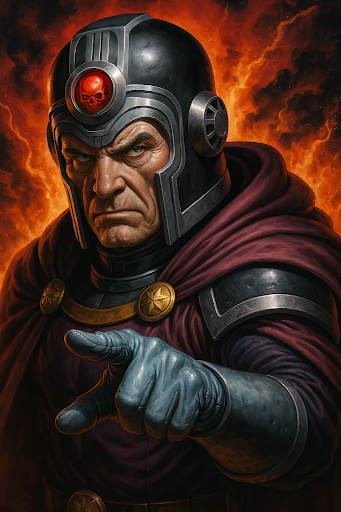Mental Man
Background
Maxwell Mercer lived a life on the margins of crime—never big enough to be feared, never small enough to be ignored. A petty smuggler with dreams of grandeur, Mercer moved illegal goods between Asia and the U.S. during the volatile late 1930s. Fate intervened during a jungle run in Southeast Asia when he discovered a strange, temple-bound artifact: a crimson psionic stone that throbbed with otherworldly energy. Mercer, driven by equal parts greed and curiosity, stole the stone and brought it home—unaware that it would be the end of Maxwell Mercer and the beginning of something far more dangerous.
Back in Chicago, Mercer spent months experimenting with the stone, discovering that it could amplify thoughts, emotions, and intentions into reality-warping power. But the raw energy was too much for his untrained mind, so he constructed a clunky, lead-lined helmet to channel the stone’s psionic potential. The armor followed—thick, plated, and absurdly theatrical by modern standards, but protective and fearsome. When he emerged in 1940 as Mental Man, he declared himself the future king of minds.
He started with bank robberies and extortion schemes, but the power twisted his psyche. Mercer became convinced the stone was speaking to him—urging him to conquer, to command, to reshape the world in his image. The voices praised him, threatened him, commanded him. Whether they were real or a product of his breaking mind has never been confirmed. Regardless, the humble smuggler faded entirely. In his place stood a self-proclaimed “Mind Emperor,” launching audacious attacks on city halls, military installations, and later, even national hero teams.
Personality
Maxwell Mercer is a tragic example of obsession turned to madness. Once a common criminal with delusions of grandeur, his exposure to the psionic stone pushed his ego into hyperdrive. Now, as Mental Man, he exists in a perpetual performance—strutting, monologuing, and asserting his imagined superiority over everyone he encounters. He speaks in theatrical declarations, referring to himself in the third person and comparing others to "insects" or "cattle."
His arrogance is almost boundless, but beneath it lies a core of fear. Mercer is terrified that without the stone, he is nothing. His every interaction is laced with defensiveness—he reacts violently to being mocked, questioned, or challenged, often with disproportionate force. He craves acknowledgment and power, but not responsibility or control. The voices in his head—whether figments of his fractured mind or entities from the stone—feed his paranoia and urge him toward increasingly destructive goals.
Despite this, he is not entirely insane. Mercer is a cunning manipulator who can fake humility or even remorse to get what he wants. He holds grudges, studies his enemies obsessively, and takes special delight in breaking “heroic minds.” Some who’ve battled him claim there are moments—fleeting and strange—where his old self seems to surface, dazed and afraid, before being buried again beneath the tyrant’s mask.
Maxwell Mercer lived a life on the margins of crime—never big enough to be feared, never small enough to be ignored. A petty smuggler with dreams of grandeur, Mercer moved illegal goods between Asia and the U.S. during the volatile late 1930s. Fate intervened during a jungle run in Southeast Asia when he discovered a strange, temple-bound artifact: a crimson psionic stone that throbbed with otherworldly energy. Mercer, driven by equal parts greed and curiosity, stole the stone and brought it home—unaware that it would be the end of Maxwell Mercer and the beginning of something far more dangerous.
Back in Chicago, Mercer spent months experimenting with the stone, discovering that it could amplify thoughts, emotions, and intentions into reality-warping power. But the raw energy was too much for his untrained mind, so he constructed a clunky, lead-lined helmet to channel the stone’s psionic potential. The armor followed—thick, plated, and absurdly theatrical by modern standards, but protective and fearsome. When he emerged in 1940 as Mental Man, he declared himself the future king of minds.
He started with bank robberies and extortion schemes, but the power twisted his psyche. Mercer became convinced the stone was speaking to him—urging him to conquer, to command, to reshape the world in his image. The voices praised him, threatened him, commanded him. Whether they were real or a product of his breaking mind has never been confirmed. Regardless, the humble smuggler faded entirely. In his place stood a self-proclaimed “Mind Emperor,” launching audacious attacks on city halls, military installations, and later, even national hero teams.
Personality
Maxwell Mercer is a tragic example of obsession turned to madness. Once a common criminal with delusions of grandeur, his exposure to the psionic stone pushed his ego into hyperdrive. Now, as Mental Man, he exists in a perpetual performance—strutting, monologuing, and asserting his imagined superiority over everyone he encounters. He speaks in theatrical declarations, referring to himself in the third person and comparing others to "insects" or "cattle."
His arrogance is almost boundless, but beneath it lies a core of fear. Mercer is terrified that without the stone, he is nothing. His every interaction is laced with defensiveness—he reacts violently to being mocked, questioned, or challenged, often with disproportionate force. He craves acknowledgment and power, but not responsibility or control. The voices in his head—whether figments of his fractured mind or entities from the stone—feed his paranoia and urge him toward increasingly destructive goals.
Despite this, he is not entirely insane. Mercer is a cunning manipulator who can fake humility or even remorse to get what he wants. He holds grudges, studies his enemies obsessively, and takes special delight in breaking “heroic minds.” Some who’ve battled him claim there are moments—fleeting and strange—where his old self seems to surface, dazed and afraid, before being buried again beneath the tyrant’s mask.

Children




Comments